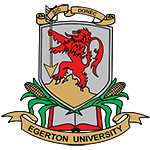History of Egerton University
Egerton University is the oldest institution of higher learning in Kenya. It was founded as a Farm School in 1939 by Lord Maurice Egerton of Tatton, a British national who settled in Kenya inthe 1920s. In 1950, the School was upgraded to an Agricultural College offering diploma programmes.
1939 - to date

The Egerton Agricultural College Ordinance was enacted in 1955. In 1979, the Government of Kenya and the United States Agency for International Development (USAID) funded a major expansion of the institution. In 1986, Egerton Agricultural College was gazetted as a constituent college of the University of Nairobi. The following year, 1987, marked the establishment of Egerton University through an Act of Parliament. Egerton University Act of 1987 was repealed and replaced by the Universities Act No. 42 of 2012 and chartered afresh in 2013.
Egerton University is headquartered at Njoro main campus. The main campus also houses the Faculties of Agriculture, Arts and Social Sciences, Education and Community Studies, Engineering and Technology, Environment and Resources Development, Science and Veterinary Medicine & Surgery.
There are also two academic directorates; College of Open and Distance Learning and Institute of Gender and Women Development Studies. The Njoro Campus also houses the Board of Undergraduate Studies and Field Attachment, and the Board of Postgraduate Studies. The University’s Nakuru Town Campus College comprises the Faculties of Commerce and Health Sciences. The Kenyatta Campus, located six kilometres southeast of Njoro Campus, hosts the Centre for Capacity Building. The University offers a wide range of programmes at diploma, undergraduate, and postgraduate levels. The University also offers other short courses at certificate level.
The University currently has an establishment of 589 academic and 1,352 nonacademic staff serving a population of 17,928 undergraduate and 560 postgraduate students. The University graduates approximately 3000 students annually.
Egerton University has made tremendous contributions towards increasing access to higher education in Kenya having mentored Chuka, Kisii and Laikipia into chartered Universities. In addition, the University has continued to contribute to knowledge generation through sustained
research initiatives. One of the major research initiatives was Policy Analysis Matrix (PAM) which was transformed into the Tegemeo Institute of Agricultural Policy and Development. Tegemeo was established for the purpose of engaging in research, analysis and outreach on policy in agriculture, rural development, natural resources and environment. The Institute aims at addressing; micro and macroeconomic policy issues bearing on farming, transportation, processing, marketing, and trade of agricultural products and inputs; sustainability of agricultural systems and natural resources as well as the environment; and commercialization, income growth and food security.
Currently there are eighty-six (86) on-going research projects. The major projects are: DGIS funded Mau Mara Serengeti (MaMaSe) Sustainable Water Initiative Project, Strengthening capacity for Participatory Management of Indigenous Livestock to Foster Agricultural Innovation in Eastern, Southern and Western Africa (ILINOVA), Indigenous Chicken Improvement Programme (InCIP), Strengthening capacity of Higher Education Institutions in Eastern And Western Africa to Enhance Efficiency in the Dairy Value Chain (Dairy Chain), Strengthening Capacities for Agricultural Education Research and Adoption in Kenya (SCARA), Deploying interactive online networking platform for improving quality and relevance of African University Graduates to Labour markets, USAID Dryland Cereals Project/CRP Legume Project, Optimal Packaging of Insurance and Credit for Smallholder Farmers in Africa, RUFORUM funded project on enhancing access to high quality seed potato for improved productivity and income of small holder farmers in Nakuru, cassava value chain upgrading for secure food nutrition income and resilience of small holder farmers in ASALs of Nakuru county and a number of projects funded by the National Research Fund under agricultural sciences, health sciences, social sciences and information, communication technology.
The University has also continued to engage in a number of capacity building projects such as Joint Delivery on International Masters in Limnology and Wetland Ecosystems (LWM), Master of Research and Public Policy (MRPP) Programme, Transforming African Agricultural Universities to Meaningfully Contribute to Africa’s Growth and Development (TAGDev), African Development Bank (AfDB) Training of Public Universities and Public Technical Training Institutions Teaching Staff at Masters and Doctorate levels in Engineering and Applied Sciences. More recently the University competitively won a World Bank grant to establish a Centre of Excellence in Sustainable Agriculture and Agribusiness Management (CESAAM) under the African Centre of Excellence (ACE II). Through these projects, a large pool of human resource is expected to be trained at undergraduate and largely postgraduate levels to meet both local and regional demands.
The University jointly established the Crop Management Research Training (CMRT) Centre with Kenya Agricultural and Livestock Research Organisation
(KALRO) and International Centre for Wheat and Maize Improvement (CIMMYT). CMRT’s mandate is to train National Agricultural Research Scientists (NARS) in crop management research in the region.
The University has the UNESCO Chair in Bioethics and hosts the UNESCO Regional Centre for documentation and research on bioethics. In 2010 the University established the Confucius Institute with the focus of promoting Chinese culture, language, and agriculture technology transfer.
Egerton University contribution to the Kenya Vision 2030 includes establishment of an AgroScience and Technology Park, Dryland Research Training and Ecotourism Centre and the Rehabilitation of Njoro River. In addition, the University has set up a Centre for CapacityBuilding to offer short courses in agriculture, small and medium size enterprises,institutional development and business and professional leadership.
In partnership with African Virtual University (AVU), the University offers courses in Computer Science under Open, Distance and E-learning (ODeL) model.
Egerton University has established a series of local and international partnerships and linkages in research, teaching, and industry. The University has established HIV and AIDS Prevention and Management Unit; Botanic Garden; Community Resource Centre and hosts the Secretariat of the African Council for Distance Education (ACDE).











